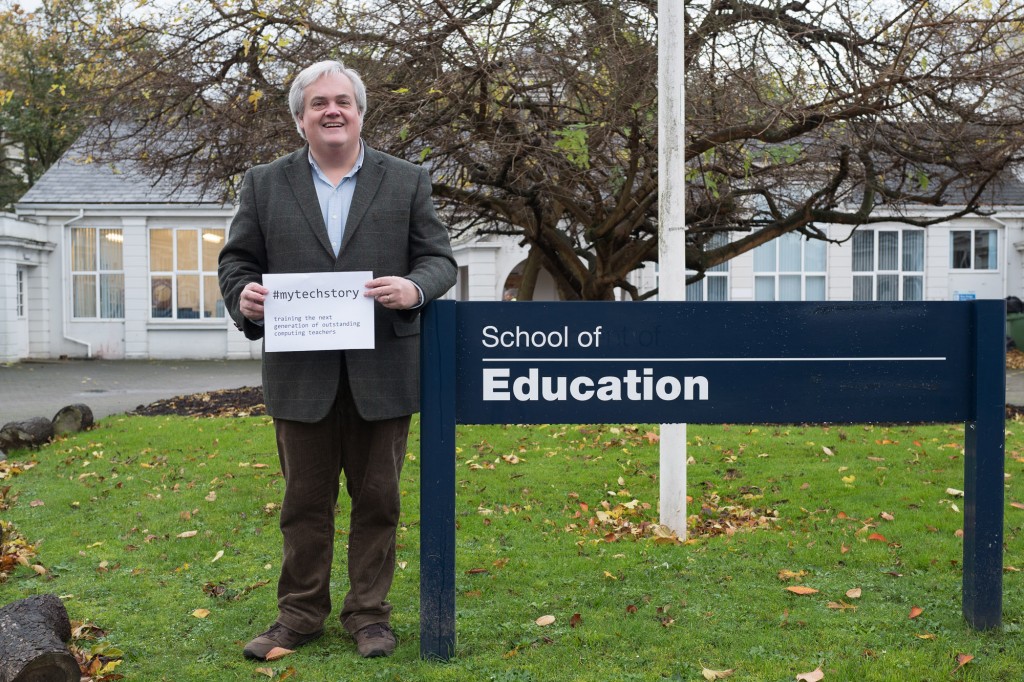#mytechstory
Dec 04, 2015
Originally published as part of a series by The Tech Partnership

I’m principal lecturer in computing education in the University of Roehampton’s school of education. Most of my work involves lecturing on our initial teacher training programmes, supporting a new generation of teachers as they train to teach computing and to use technology to enhance their teaching and their pupils’ learning. I’m involved with a good number of projects in computing education beyond Roehampton, including the Switched on Computing scheme of work for primary schools, national and international speaking and consultancy and board membership for Naace and Computing At School.
Although I’m slightly older than the internet, I got interested in computing very early on: at the age of six, I announced I wanted to be a programmer when I grew up, having been inspired by Ladybird Books’ How it Works: The Computer. My father was something of a geek himself, bringing home an early Sinclair calculator, as well as log tables and slide rules: my interest in technology was certainly linked to my interest in mathematics, but I’m still unsure of which was chicken and which egg.
I learnt to program through the inspiration of the head of maths at my secondary school, bringing in his own computer to teach a few of us BASIC programming, as well as plenty of time exploring, experimenting and playing with the Sinclair ZX81 and BBC Micro at home. I’ve an O Level in Computer Studies – creating a graph plotting and linear correlation program for my project work.
I studied maths at university, but also: attended first year computer science lectures, learning some functional programming in ML; fell in love with the Mac particularly for computer algebra and DTP; had holiday jobs creating spreadsheet models and maintaining statistical analysis systems in Fortran; and did some voluntary teaching in a local secondary school. Perhaps surprisingly, it was the teaching that I pursued as my career, staying on for a PGCE and then spending eighteen years working across four schools.
As well as looking after the ICT curriculum in most of these places, I also ran or managed the techie side of the network: these days, it’s unusual to combine both roles, but this meant we could do some pioneering things in web development, virtual learning environments, blogging and thin-client networks.
I moved into higher education back in 2010. The beginning teachers I work with are great people: with them, there’s such a sense of teaching as a vocation, a desire to do all they can for those in their care, and the curiosity, courage and creativity that will make them great role models for their pupils. I still get to do some geeky things, including some work as technical lead for a EU art/blogging project with partner universities in Finland, Czech Republic, Portugal, Spain and Ireland and developing a bespoke blogging / eportfolio platform for our students.
The last four years have seen a massive shift from ICT to Computing in both primary and secondary schools, and it’s been my privilege to be part of this process, through early work developing Switched on ICT and Computing At Schools’s Computer Science curriculum, then as part of the drafting panel for computing on England’s national curriculum, and subsequently through a number of the support, training and implementation projects, such as Switched on Computing, QuickStart Computing, Barefoot Computing and Code Club Pro.
The new curriculum is an unashamedly ambitious one, seeking to equip pupils with computational thinking and creativity so they can understand and change the world. There are though big challenges here, not least ensuring that teachers have the subject knowledge they need so they can teach this subject confidently and effectively.
What interests me now is researching how programming and other aspects of computer science are best taught or learnt in school: we’ve evidence from the early days of Logo programming in schools, and present day work with undergraduate computer science students, but we’re gradually developing the teaching profession’s shared expertise in effective classroom. I’m also rediscovering my statistical background, getting interested in data mining, machine learning and predictive analytics in the context of education, and gradually getting to grips with analysis and programming in the utterly fab R.
Share